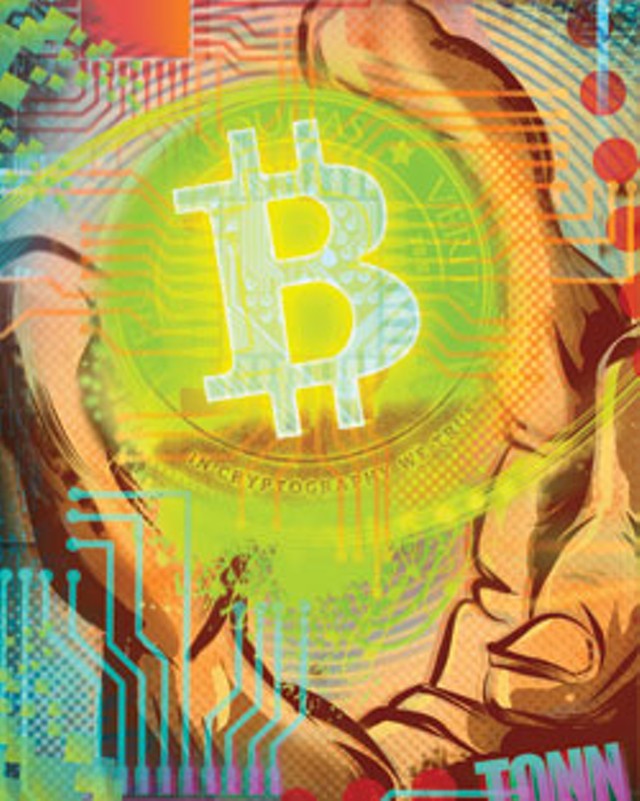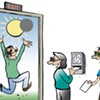Published November 27, 2013 at 8:41 a.m.
Last week, in a small, subterranean workspace near downtown Burlington, a group of tech-savvy Vermonters held an open forum on a topic that’s attracted a great deal of attention lately: Bitcoin. Early adopters of the “cryptocurrency” believe it has the potential to upend the entire global economy.
Economic policy and the future of currency may seem like pretty dry subjects for a weekday evening meeting, but everyone in attendance was as enthusiastic as Sunday-afternoon football fans. Beers were drunk and slang was slung, even as the discussion turned to such topics as fiduciary decentralization and the effects of arbitrage on currency stability.
Those who are keen on Bitcoin are really keen on Bitcoin, and that includes several of the members of Laboratory B, the “community hackerspace” that hosted the discussion. Also in attendance at the event were a number of other locals who had personal or professional interests in Bitcoin.
It was clear that everyone present viewed Bitcoin as a “disruptive technology,” perhaps even the epitome of an internet-era game changer. If Bitcoin really takes hold — and it’s been showing signs of strength lately — then it has the potential to impact the economy at nearly every level, from buying a cup of coffee to reporting taxable income to facilitating international transactions.
But Bitcoin still has some pretty steep hurdles to surmount. One of these is its extreme volatility: Just this month, its value has ranged from $350 to $900, a wild fluctuation that encourages hoarding. That alone is a serious problem, as even enthusiasts acknowledge.
Bitcoin’s most serious challenge, however, is the simple fact that most people still don’t know what it is or how it works. Here’s a quick summary:
Bitcoin is a virtual currency — its form is digital, not physical — that is distributed from peer to peer without the intervention (adherents might say “meddling”) of any central banking authority. Bitcoins exist in finite supply, and can only be obtained by “mining” them — that is, using large amounts of computing time and power to process the code that generates the currency. Another way to put it is that the currency doesn’t technically exist until people put in the effort to mine for it. In this way, the coins’ value is tied to the labor (and processing time) used to create it. (A video that explains this further can be found at weusecoins.com/en.)
Bitcoins are both private and public. They are private in that each Bitcoin is associated with a digital “wallet” that belongs to a single user; they are public in that every Bitcoin transaction is permanently recorded on an openly accessible ledger known as the “blockchain.”
Owing to its status as the preferred currency at Silk Road — the recently shuttered online black market for illegal goods and services — Bitcoin carries the taint of the illicit. Still, no less a financial maestro than Federal Reserve Chairman Ben Bernanke recently opined that virtual currencies “may hold long-term promise, particularly if [they] promote a faster, more secure and more efficient payment system.”
Those qualities, as well as Bitcoin’s low transaction costs, represent its primary appeals for devotees. A retailer typically pays a fee of between 2 and 3 percent of the purchase price of an item for every credit-card transaction; PayPal’s rates are similar. No standard fee scale currently exists for Bitcoin transactions, but rates are no higher than 2 percent, and most transactions carry no surcharge at all.
Once a consumer comes into possession of Bitcoins, he or she may sell them for their equivalent in hard currency (such as dollars or yen) or spend them online (most Bitcoin transactions occur in cyberspace) or in a brick-and-mortar store. Bitcoin differs from credit cards in that neither its exchange for currency nor its trade for goods or services necessarily incurs fees. Once buyer and seller exchange wallet information, the value is simply debited from one account and deposited into another.
Another option is to hold onto Bitcoins and hope they increase in value. In this sense, Bitcoin is a commodity, like gold or crude oil. At the moment, there’s a lot of Bitcoin hoarding going on; with its value on a steady climb, people are reluctant to sell what they have.
That Bernanke and other federal economic policymakers have spoken out on Bitcoin is somewhat surprising since, to this point, much of the discourse on the subject has occurred on online discussion boards. While national publications such as the New York Times and the Atlantic have been covering Bitcoin for several years, this topic belongs to the internet, largely because Bitcoin itself is not possible without digital interconnectivity.
Those online discussions about Bitcoin are surprisingly passionate. Its vaunted potential to undermine entire economies appeals both to internet denizens who associate themselves with the “99 percent” movement and to libertarian types.
Some of the discussion at Burlington’s recent Bitcoin meetup was tinged with that spirit of dissent and rabble-rousing. Attendees discussed the arbitrariness and unfairness of banks’ policies and the freedom that the average citizen would ostensibly experience should currency be divorced from any single nation-state.
But those nation-states may intervene before the masses have the chance to do so. Bernanke’s statement confirmed that Bitcoin is now a topic of federal interest, but the technology’s reach exceeds national boundaries. As with so many other complex and potentially troublesome economic changes in recent years, many economists have pointed fingers eastward.
The world’s largest Bitcoin exchange by volume, BTC China, has attracted several large investments in recent months. Chinese buyers have been the most aggressive purchasers of Bitcoin, a fact that concerns even the Bitcoin faithful: If the currency is designed to be decentralized, what happens when one country controls the lion’s share of it? (Check fiatleak.com for a real-time, animated map that depicts the flow of Bitcoins across national borders. China looks like a Bitcoin vacuum cleaner.)
It’s difficult to study any inroads that Bitcoin may have made in Vermont — in part because of the currency’s decentralization, which extends to its user base. Matt Cropp, 27, a social worker and member of Laboratory B, couldn’t think of any local businesses that accept Bitcoin. When he has used the cybercurrency himself, it’s been primarily for “informal debt settling,” he says, such as compensating a friend who helped him build a website.
Still, there are isolated upticks of interest in Bitcoin inside Vermont’s borders. In 2012, Jeremy Hansen, an assistant professor of computer science at Norwich University, made headlines for his announcement that his campaign as an independent candidate for Vermont State Senate would accept Bitcoin donations. The Cabin at Killington, a vacation lodge whose website touts its techno-amenities as well as its proximity to the wilderness, is one of the few Vermont businesses that accept payment in Bitcoins.
Or not. It’s damnably difficult to find a simple location-based list of Bitcoin businesses. The wiki site dedicated to Bitcoin links to several third-party sites that claim to provide such a service, but every one of them came up dry in Vermont-specific searches. (The Cabin at Killington didn’t even show up.) If you live in Vermont and have Bitcoins burning a hole in your virtual pocket, how are you supposed to spend them?
It’s not easy, without a regulatory agency overseeing such transactions. A few websites (LocalBitcoins.com is one) facilitate meetings between parties who wish to exchange Bitcoins for dollars, or vice versa. Agree on a set time and place, meet up and, if the deal seems sound, exchange the wallet information that permits the trading of currencies.
Poking around on Craigslist can also turn up buyers and sellers who prefer to deal in Bitcoin. Neither of these options inspires consumer confidence. And it doesn’t help that insane, illegal projects — such as the website Assassination Market, which is exactly what it sounds like — accept only Bitcoin.
One thing you can do with Bitcoin in Vermont is buy a pizza at Folino’s in Shelburne. Restaurant owner and manager Buddy Koerner, 25, has been interested in Bitcoin since its inception a few years ago, and decided just last week to accept it as payment for his restaurant’s wood-fired pizza.
Koerner announced his decision on reddit.com and, in less than a week, garnered nearly 20,000 page views. “I can accept [Bitcoin] and turn it into money that same day,” says Koerner of the reasons behind his decision. “It took about five minutes [to create an account], and it didn’t cost me anything.” He notes that the current media fixation on all things Bitcoin has already brought him plenty of publicity.
So far, Koerner estimates that Folino’s has sold about 10 pizzas for Bitcoins. That’s the short-term gain. But he believes there are long-term benefits, as well: If the currency continues its current rise in value, he can sell his Bitcoins for significant profit in the future.
Koerner acknowledges that the learning curve necessary for understanding Bitcoin may be even steeper than its recent surge in value. “It’s really complicated to understand exactly what’s going on [with Bitcoin], and that’s confusing people,” he says.
Mike Ferland, 27, an IT professional with Pine Computers in South Burlington, is, as he puts it, a Bitcoin “evangelist.” He’s launched a website, BlowStamps.net, that’s kind of an information clearinghouse for Bitcoin newcomers. Ferland is working on a list of businesses that accept the currency. During the Bitcoin meeting, he paused at one point to snap a picture of Laboratory B’s QR code with his smartphone, thereby making a small Bitcoin donation to the lab.
Ferland believes that Bitcoin’s future may hinge on its adoption by the kinds of small companies that traffic in organic goods or Fair Trade products — companies for which Vermont is an incubator. He suggests companies with progressive values are most likely to embrace Bitcoin “as long as they have a geek to show them the way.”
David Lansky, 57, is a statistician with Precision Bioassay in Burlington. He says he attended the recent meeting simply out of a keen curiosity. He has no experience buying, selling or mining for Bitcoins, “but I’m tempted,” he says.
Lansky regards Bitcoin’s limited success so far as “proof of concept,” especially in light of the governmental bungling that contributed to the current recession. “What surprises me,” he says, “is how eagerly the Senate Finance Committee, the Treasury Department and some of the big lobbying groups seem to be ready to adopt [Bitcoin]. I don’t know what’s driving that.”
Though he’s wary of some of Bitcoin’s less savory associations, Lansky admires its potential to foster local economic development. He likens Bitcoin to Burlington Bread, a local currency that, though it ultimately failed, played a role for 10 years in ensuring that money earned in Burlington was also spent there.
Indeed, Bitcoin may foster local spending in exactly the kinds of transactions that Cropp describes, although the geographic source of a Bitcoin payment is not easily detected. Moreover, as Cropp points out, Bitcoin is the lowest-friction way to settle international debts. “Where it’s crossing borders,” he says, “is where the biggest advantage for using [Bitcoin] is.”
At the moment, several political action committees, which are prohibited by law from accepting foreign funding, are lobbying for permission to accept Bitcoin donations. While many adherents believe that Bitcoin has the power to radically destabilize global political and economic systems, it could just as easily be used to concentrate existing power even further.
Such problems are likely to be inevitable consequences of using online currency in general, not just Bitcoin. Other cryptocurrencies have arisen to challenge Bitcoin, including Freicoin, Peercoin, Litecoin and at least a couple of dozen others. (Bitcoin’s capitalization, however, is by far the largest.)
“We sort of have a global currency — the dollar,” says Cropp, “but it’s rooted in a nation-state. As things become more interconnected, and the autonomy of individual nation-states seems to be dissolving a little bit … having a form of money that is its own individual entity is kind of timely.”
In Vermont, as elsewhere, Bitcoin’s prospects are complex and confusing. And the currency could cause as many problems as it would solve.
For all of the confusion and difficulties that Bitcoin may present, however, the overall mood of last week’s meeting in Burlington was one of excitement. Not the excitement of future financial rewards: Profit seemed incidental to these early adopters. This was the excitement that accompanies the first stages of an unpredictable, fascinating and potentially world-changing experiment.
The original print version of this article was headlined "Digital Dough"
More By This Author
Speaking of Tech
-

Williston Tech Company Polly Lays Off 17 People in Vermont
Dec 5, 2022 -

Report: Investment in Vermont Companies Soared Nearly 500 Percent Last Year
Apr 5, 2022 -

Tech Biz Resonant Link Raises $9 Million, Plans to Double Staff
Feb 9, 2022 -

Hire Anxiety: Layoffs Jolt Burlington-Area Tech Sector
Nov 6, 2019 -

Iconic Tech Firm MyWebGrocer to Be Bought by Florida Company
Oct 15, 2018 - More »
Comments
Comments are closed.
From 2014-2020, Seven Days allowed readers to comment on all stories posted on our website. While we've appreciated the suggestions and insights, right now Seven Days is prioritizing our core mission — producing high-quality, responsible local journalism — over moderating online debates between readers.
To criticize, correct or praise our reporting, please send us a letter to the editor or send us a tip. We’ll check it out and report the results.
Online comments may return when we have better tech tools for managing them. Thanks for reading.















































